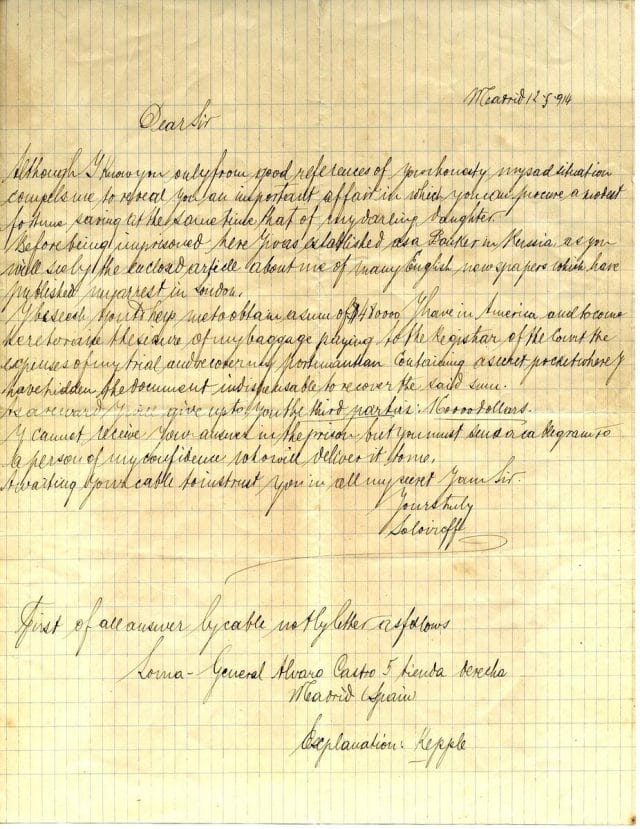Dear Sir,
Although I know you only from good references of your honesty, my sad situation compels me to reveal to you an important affair in which you can procure a modest fortune, saving at the same time that of my darling daughter.
— “Spanish Prisoner Letter” circa April 1914
***
You receive a letter, generically addressed, from a person in a foreign country. The writer claims to have been estranged from an improbably large sum of money. Though you are a stranger to him, he needs your help in getting it back. He promises to handsomely reward you in exchange for this minor favor. Please contact him to discuss the details.
Most of us only read this kind of thing if we dip into our email spam folder. Everyone knows that Nigerian Prince doesn’t really need your help, and isn’t really a Nigerian Prince. If you respond, the email writer’s plan is to tell you that he only needs a small (compared to the payment he’s promised) loan to reunite him with his money. If you give him any money, it’s only a matter of time before he claims to have run into a logistical issue, and that he needs another loan to deal with it. He’ll string you along until satisfied that he’s bled you dry. Or, if you give him enough personal information and he’s savvy enough, he’ll just hack your bank account.
“Who still falls for this shit?” you might wonder when you look through your spam folder, “Their returns must be minimal. It’s the oldest trick in the book.”
The thing is, you don’t know how right you are about that — and how wrong. This scam has been around for a really long time, meaning it’s had a really long time to die out. But it’s still here. It started out as snail mail spam, over a hundred years ago. The quote at the top of this page is from a handwritten letter from 1914.
Have Money! Please Help! Need Money!
This kind of scam is called advance fee fraud, because the victim is asked to pay a small fee in advance of receiving a large payment (which never comes). It’s also called a “Nigerian money offer” because many of these email scams — although certainly not all of them — are operated out of Nigeria, and Nigerian criminals led the wave to revive these scams in the Internet era. In the 1980s, Nigeria was home to a bunch of mail and fax-based advance fee scams. It’s also called a 419 scam, which is the section of the Nigerian criminal code dealing with fraud. This scam’s history reaches much farther back than that, though.
In fact, a 1898 New York Times description of the scam could easily describe the version still in circulation today, only they call the con the “Spanish Prisoner.” From an article titled “An Old Swindle Revived”:
“A man in this country receives a letter from a foreign city. […] The letter […] is written as fairly well-educated foreigners write English, with a word misspelled here and there, and an occasional foreign idiom. The writer is always in jail because of some political offense. He always has some large sum of money hid and is invariably anxious that it should be recovered […] He knows of the prudence and good character of the recipient of the letter through a mutual friend, whom he does not mention for reasons of caution, and appeals to him in time of extremity for help. He is willing to give one-third of the concealed fortune to the man who will recover it.”

The photo above is of the letter from 1914, and probably part of the same surge of swindles the Times reported on. Gorgeous, painstaking handwritten cursive can be hard to read, so here’s a summary: The letter details the trials and tribulations of one “Serge Solovieff,” an imprisoned Russian banker, who needs help recovering funds he’s hidden in America. The envelope enclosed a newspaper clipping about Solovieff’s arrest.
One copy of this letter was discovered in the 2000s by Richard Seltzer. Seltzer posted it online, and many more people, who had found almost identically worded letters, found his by googling Solovieff’s name and got in touch with him. You can see photos of these other examples on the website. Their letters were written in different handwriting, suggesting that none of them were written by Solovieff.
“My best guess,” Seltzer writes, “is that hundreds, if not thousands of these letters were sent to random recipients (like modern email spam), and that enough of these recipients took the bait and enriched the perpetrators to make this a very profitable venture — one to be tried again and again and to be passed along from one schemer to another.”
His guess was a good one. The Times article quoted above — which again dates from 1898 — cited police authorities as saying the swindle had been in operation for “more than 30 years,” and warned Americans against it. But it turns out that the French had suffered these spammy letters even longer ago than that.
The 1832 memoirs of Eugène François Vidocq, a French criminal-turned-private-investigator, detail a swindle executed by prisoners. “[Prisoners] obtained the address of certain rich persons living in the province,” Vidocq writes. “Which was easy from the number of prisoners who were constantly arriving. They then wrote letters to them, colloquially referred to as ‘letters of Jerusalem.’” The memoir includes an example, reproduced below:
“Sir,–You will doubtlessly be astonished at receiving a letter from a person unknown to you, who is about to ask a favour from you; but from the sad condition in which I am placed, I am lost if some honourable person will not lend me succour: that is the reason of my addressing you, of whom I have heard so much that I cannot for a moment hesitate to confide all my affairs to your kindness. As valet-de-chambre to the marquis de ——, I emigrated with my master, and that we might avoid suspicion we travelled on foot and I carried the luggage, consisting of a casket containing 16,000 francs in gold and the diamonds of the late marchioness.”
You probably know what’s coming next. In order to conceal their identities in transit, the writer says he and the “marquis” had to abandon and hide their gold-and-diamond casket somewhere. When the writer was sent back for the money, he was apprehended before retrieving it, and imprisoned for not having a passport.
“In this cruel situation, having heard mention of you by a relation of my master’s […] I beg to know if I cannot, through your aid, obtain the casket in question and get a portion of the money which it contains. I could then supply my immediate necessities and pay my counsel, who dictates this, and assures me that by some presents, I could extricate myself from this affair.
“Receive, sir, &c.
“N——-“
The letter had a 20% response rate, according to Vidocq.

A different famous French detective
Why it Keeps Coming Up
The short explanation for why this scam has not died out is that it’s still working. And it’s still working for a lot of the same reasons it did two hundred years ago. The Times article also touches on part of the swindle’s brilliance:
“As it is worked in two countries the detection and punishment of operators are practically impossible, especially as the victims rarely complain. Nobody knows how many people have been cheated nor how many thousands of dollars have been sent from this country in pursuit of the buried fortune that is always the bait.”
Since the swindle preys upon the very vain and the very gullible, these people are often too embarrassed to come forward as victims. Estimates of the losses to advance fee fraud are all over the place, but here are a few: American complaints totaled $198.4 million in 2007, and Ultrascan claims $12.3 billion were lost to the con globally in 2013. And the fact that the money is being transferred overseas, often to a country with relatively poor banking infrastructure, still makes the money very hard to trace and recover, and the perpetrator very hard to prosecute.
There are a few things that have changed in the modern era. On one hand, because of the Internet, many people now know about the fraud — there are fewer marks out there. Fraudsters tweak their stories to avoid detection, but their claims are still outlandish, and it still takes a particularly greedy and trusting eye not to spot them. But technology has made a profitable mark easier to contact. It costs the perpetrators practically nothing to send these emails, especially considering the right victim can be worth tens of thousands of dollars, if not millions.
As a Microsoft Researcher pointed out, this a low conversion rate actually works to the fraudster’s advantage. Because you have to be pretty gullible to reply to a well-known and poorly executed fraud, they waste less time in the intensive process of corresponding with people who won’t pay-up, or will only be stick with them for a few small payments:
Failure to repel all but a tiny fraction of non-viable users will make the scheme unprofitable. The mirth which the fabulous tales of Nigerian scam emails provoke suggests that it is mostly successful in this regard. A less outlandish wording that did not mention Nigeria would almost certainly gather more total responses and more viable responses, but would yield lower overall profit.
(Because of this, some people recommend scam baiting: once you’ve recognized an advanced fee fraud, tricking the fraudsters into corresponding with you to waste their time, thus diminishing their returns. An amusing prospect, if not morally questionable.)

One way to scambait a fraudster who wants your computer — send him a fake computer
Another change in modern advance fee fraud is that the expansion of the internet and email technology to different parts of the globe has expanded both the pool of victims and the pool of swindlers. Back in 1800, the “letter from Jerusalem” worked until it knowledge of it saturated the rich community of a particular province. Knowledge of advance fee fraud might eventually saturate the Western world to the point of impracticality, but in the meantime the fraud can exploit wealthy people in the corners of the globe where internet infrastructure and culture are still developing. One Mother Jones reporter says the Nigerians swindlers she spoke to mostly make their living conning other Nigerians — sometimes while disguising themselves as Ghanaians. Others have moved to social media, and less suspecting pockets of the internet: ever wonder why so many random strangers have tried to friend you on Facebook?
If there’s anything that history has taught us, it’s that the hardworking engineers building our spam filters are but a temporary salvation, and this fraud is going to be with us as long as strangers can contact one another. The oldest trick in the book didn’t get this old by not working.
This post was written by Rosie Cima; you can follow her on Twitter here. To get occasional notifications when we write blog posts, please sign up for our email list




